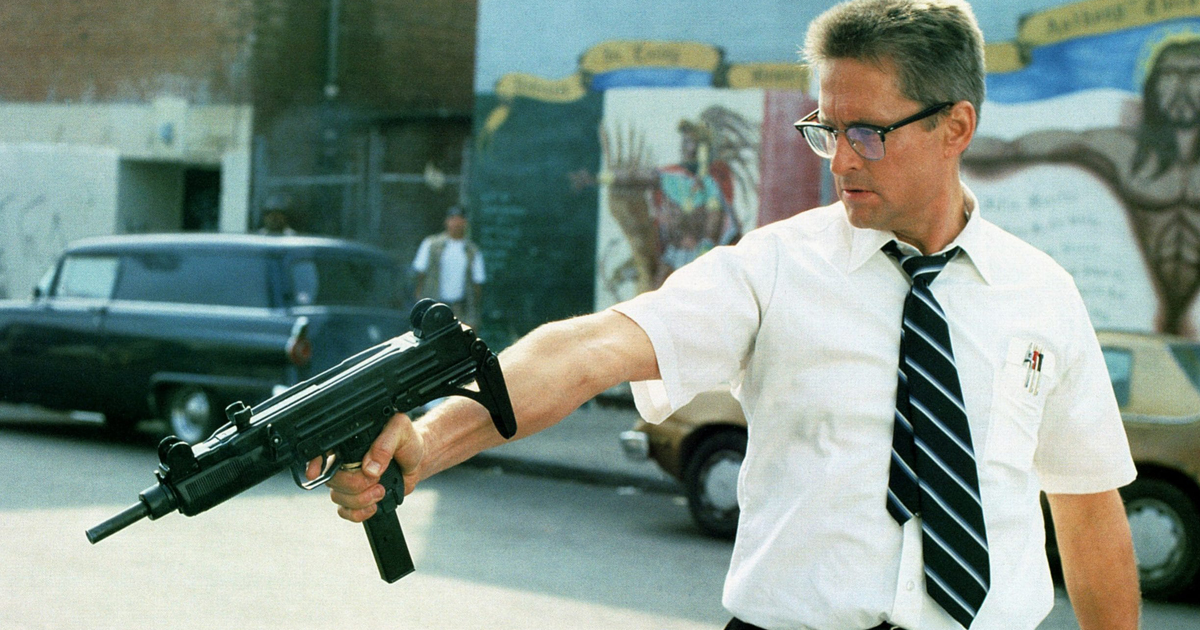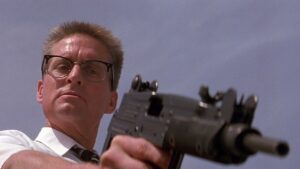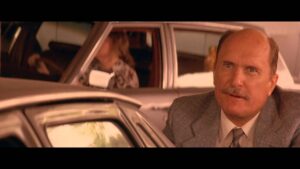
Watching the protests, unrest and violence of the last few weeks made me think back to a movie I watched on cable as a teenager in the mid 90s: “Falling Down.” Starring Michael Douglas and directed by Joel Schumacher, “Falling Down” is a dark comedy centered around a white, middle-class Defense Industry worker (nicknamed D-Fens) who, after sitting in a LA traffic jam on a sweltering summer day, snaps and goes on a violent odyssey across Los Angeles. He walks through different neighborhoods interacting with the rude, angry and selfish residents (usually with explosive results) on his way home to see his estranged wife and kid. Meanwhile, Pendergast, a desk-jockey cop on his last day before retirement, brilliantly underplayed by Robert Duvall, must track down this maniac and stop him, all while struggling against the abuse and neglect of his colleagues and boss. I remember liking the concept. What brings someone to say “enough is enough” and push back at the slings and arrows our society heaps upon the average man just trying to go about his business? I decided to revisit the movie to see how it has aged and if the story and message resonated today.
I was surprised to discover it was directed by Joel Schumacher. He tones down some of his more grandiose instincts enough to keep the film exciting without going over the top. “Falling Down” was probably meant to be more humorous than how it was delivered. The comedy is subtle and many of the jokes don’t land because Schumacher doesn’t really have a feeling for comedy. The cinematography by Andrzej Bartkowiak elevates the movie though. Los Angeles feels like a sweaty, chaotic mess, and the camera work and tension he is able to milk out of scenes definitely portended one of his finest works released a year later (and one of my favorite action movies of all time): Speed. As for the acting, this has to be one of Michael Douglas’ finest performances. He plays the anti-hero D-Fens with wry, self-deprecating humor barely containing the simmering rage underneath. He wavers between self-righteousness and self-doubt and creates a character that is consistently sympathetic even as we become more and more disturbed by his actions. I really like the choice to give him a crew cut, glasses and button-up shirt as if he walked directly off the set of “The Right Stuff.” He is definitely the main antagonist of the film, but writer Roe Smith (more known for his acting than his writing chops) does an admirable job of giving D-Fens, and almost all of his main characters, complex motivations. The character seems almost prophetic now, embodying the legions of white working-class men raging against their loss of status as factories were closed, jobs were shipped overseas and pensions were defaulted on after Reagan’s “shining city on a hill” promise during the 80s became the reality of the 90s. We learn D-Fens was fired from his job and is unable to pay child support.

“I didn’t lose my job, it lost me. I’m overeducated, under-skilled. Maybe it’s the other way around. I forget,” says D-Fens while holding a groundskeeper and his family hostage at gunpoint. His identity and sense of self-worth were tied to his ability to provide for his fractured family and once that was taken away, it really was the last straw. The traffic jam may have been the catalyst but the combustible chemical concoction was created by his unemployment. D-Fens feels betrayed by society; he followed all the rules and still ends up an unemployed, lonely loser.
“They lied to me,” he screams towards the end of the movie. Society didn’t hold up its end of the bargain. If only someone could make America Great again, D-Fens would have a job, his wife back and a family.
Halfway through the film is a scene that left an unsettling impression on me when I first watched it, that years later I would look back and identify as a moment of growth. A black man in a suit, played by Vondie Curtis-Hall, holds up a sign that reads “Not economically Viable” as he protests in front of a bank that denied him a loan. He angrily calls to on-lookers, demanding…what? Answers? Understanding? Sympathy? The cops quickly show up and arrest the non-violent protestor, handcuff him and toss him in the back of a squad car. As he is hustled into custody, he exchanges a look of affirmation from D-Fens. They both share an exchange as if to say “we are on the same side of this fight” and then he is gone, from the scene, and from the story completely. I kept hoping to see more of this character. What was his deal? What was his day like? Looking back, this was the beginning of my journey to understand Point Of View and how it completely shapes a story.
In my research for this article, I learned some incredible facts about the production of “Falling Down.” Production was halted and locations were moved to respond to the riots after the Rodney King verdict. The hazy, smoke-filled sky during the traffic jam scenes, used expertly by Bartkowiak, was from the fires of building burned by rioters. Black Americans were crying out in rage and despair about the injustice in the system, and what does Hollywood produce? A dark comedy about white, male angst. What if Hollywood in the 90s created a dark comedy about an African American man, fed up with racism and abuse, takes the law into his own hands and violently revenges himself upon each perceived slight? It’s difficult to imagine that film being created now, much less during the 90s, but how much more powerful would it have been to empathize with the average black Joe, minding his own business, getting profiled by white supremacist cops, denied loans by biased banks, who, one day, stuck in rush hour traffic on his way to a job where he was lost his promotion to a less qualified white colleague, decides enough is enough and goes full-on vigilante. He is tracked down by an African-American cop, who played by the rules his entire life and competed in a system where he had to work twice as hard to get half as far. The two philosophies come to a head at the end where the cop shoots the angry Black Joe, who it turns out is unarmed. I think that story would terrify Hollywood even now. How much more relevant would that story have been to the African-American reality of Los Angeles than a two-minute scene about bank loans. Maybe we could have had an actual conversation about institutional racism and have a little more empathy for the average black-joe. Instead, we got the presaged MAGA warrior of D-Fens vs. the old guard conservative of Pendergast. Still an interesting and effective movie, but a missed opportunity.
Viewing “Falling Down” today, many of the characters come off as extreme, negative stereotypes straight out of Hollywood central casting. There is the rude Korean shop owner Mr. Lee (played by Chinese American Michael Paul Chan) who speaks with such a heavy accent that D-Fens tells him “you come to my country, you take my money and you don’t even have the grace to learn my language.” The scene made me feel a little uncomfortable with the brazen negative stereotype of a Korean grocer, but the brutal honesty of this scene was refreshing to see. Are we, as the audience supposed to sympathize with D-Fens for lashing out against a rude immigrant? Or should we feel for the shop owner who is attacked as being un-American? I think the answer can be explained by the close-up shot of the American flags being knocked over onto the floor during their scuffle over the baseball bat hidden behind the counter. A little on the nose, Schumacher, but point taken. There are also the two Latino gangbangers who instantly assault a white man harmlessly resting in one of their neighborhood parks. They demand money and instead get a beating. The writer made sure to include plenty of minority roles in the police department as if anticipating the criticism, “see, I’m not racist, here’s an Asian cop, and a Latino cop”. Pendergast’s ex-partner is Sandra played by Latina actress Rachel Ticotin and Japanese detective played by Steve Park who gets to have a funny scene calling out Pendergast’s ignorance of the difference between Japan and Korea. To be fair to “Falling Down,” nobody is safe from comeuppance; it is almost egalitarian with its violence. White people are also portrayed as lazy construction workers, homeless beggars, rich entitled golf players and an actual neo-nazi. In fact, black people are almost entirely absent from the film except for the “economically viable” scene.

When I watched “Falling Down” 30 years ago, I felt the anti-hero D-Fens spoke directly to my white, suburban teenage angst. He embodied my desire to rebel against an unfair and uncivil society. Even at the age of 15, I understood the insanity of modern society; to sit in bumper to bumper traffic in sweltering heat to commute to a job that underpays and undervalues one’s worth for the enrichment of “the boss”. I delighted in joining Michael Douglas on his odyssey across Los Angeles as he confronted and overcame the insults, the rudeness, the casual cruelty of his fellow citizens, like a violent Larry David in an episode of Curb Your Enthusiasm directed by Sam Pekinpah.
I certainly identified more with D-Fens than Pendergast, the soft-spoken, desk-jockey detective on his final day before retirement. I also applauded the message of the movie when D-Fens utters the painful question as confession during the climactic standoff with Pendergast while he holds his own daughter hostage, “I’m the bad guy?”. Both older white men played the part society demanded, getting kicked, bullied and exploited then tossed aside once their usefulness is over. Pendergast rides gracelessly into the sunset, standing up to his asshole bosses and his manic-depressive, shrew of a wife, while Douglas is gunned down, leaving his life insurance as his only legacy to a daughter who will hopefully use the funds for therapy to heal from the trauma of having her violent father blown away by the police. Who is the true hero in this story? Pendergast, I suppose. Why did I like such a depressing, dark comedy? Because watching “Falling Down” allowed me to live vicariously through D-Fens’ actions, delighting in his anti-social and violent behavior but still stay within my moral framework. As entertaining as it is to watch his exploits, he is the villain, he gets what he deserves, and the rule-following Pendergast is triumphant. D-Fens’ protest leaves its little ripple but society keeps flowing on, unchanged.
At 15, My parents were generous enough to allow me a television set and cable in my attic room, which meant staying up till 3 a.m. on school nights bingeing encore (hit movies from the 60s, 70s & 80s) as well as Turner Classic Movies, Starz and HBO. I drowned myself in cinema. I heard George Lucas was inspired by Japanese filmmaker Akira Kurasawa so I had to watch all of his films. It opened up a strange new world of experience. Seven Samurai was based on Westerns? Magnificent Seven was a remake of Seven Samurai? What the heck is going on? I devoured Hong Kong action films and Italian Giallo horror flicks. The voices and viewpoints of these films felt like dispatches from an alien world. They didn’t conform to the structures and norms of my society. When I attended college, I finally discovered French New Wave, German expressionism, experimental films and so many other film movements it’s hard to keep track. This allowed me to understand how cinema expresses ideas and emotions more concretely than almost any other art form. As Roger Ebert said, “Movies are the most powerful empathy machine in all the arts. When I go to a great movie I can live somebody else’s life for a while.”
Is it the responsibility of the filmmaker to endorse the status quo or challenge an audience? Perspective matters. When it comes to story, point of view is everything. A hero in one story can be the antagonist in another. It depends on where the writer chooses to ground the audience. That’s why I have been so encouraged by the contemporary push towards diversity in film, art, music & television. When executed sincerely, diversity enriches our cultural conversations and really can save our souls.

